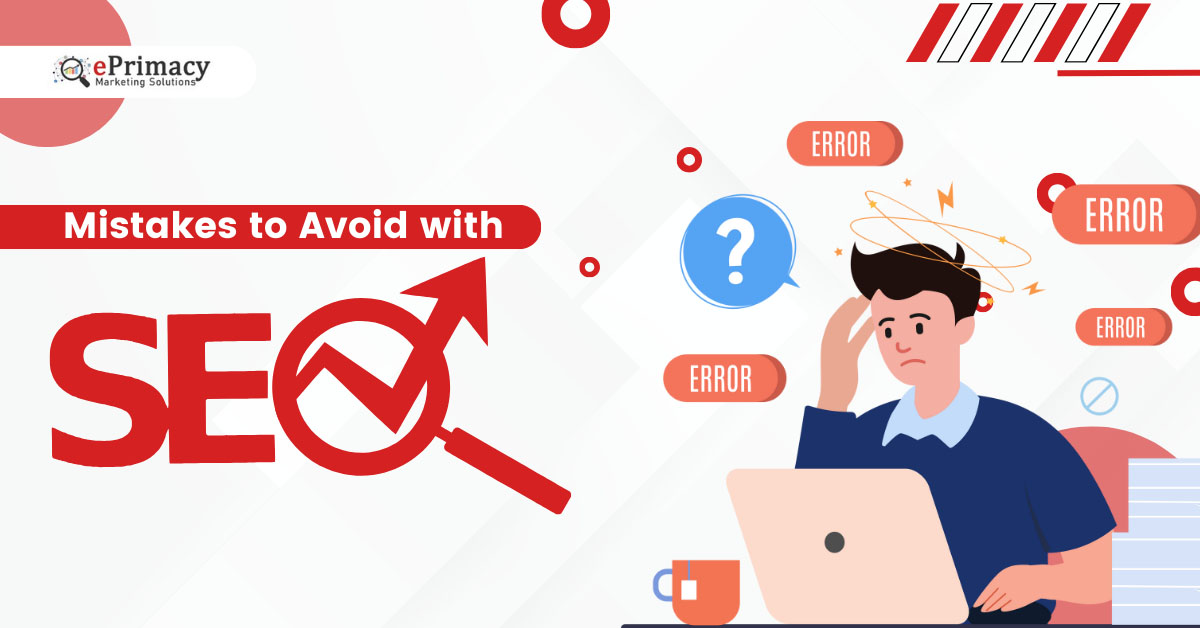In the ever-evolving landscape of the digital world, Search Engine Optimization (SEO) remains a crucial factor for the success of any website. SEO is the art and science of optimizing your website to improve its visibility on search engines like Google, Bing, and Yahoo. An effective SEO strategy can drive organic traffic, enhance your online presence, and ultimately increase your website’s conversion rates. However, SEO is not a one-size-fits-all solution, and many website owners make common mistakes that can hinder their efforts.
In this comprehensive guide, we will explore the most prevalent mistakes to avoid for effective SEO.
Key Mistakes To Avoid
- Ignoring Keyword Research
One of the foundational aspects of SEO is keyword research. It involves identifying the specific words and phrases that your target audience uses to search for information online. Failing to conduct thorough keyword research can result in poor content optimization and missed opportunities for ranking. Tools like Google Keyword Planner and SEMrush can assist in finding relevant keywords for your niche. - Neglecting Mobile Optimization
With the majority of internet traffic now coming from mobile devices, it’s crucial to have a mobile-friendly website. Ignoring mobile optimization can lead to a poor user experience, high bounce rates, and lower search engine rankings. Ensure that your website is responsive and loads quickly on mobile devices. - Ignoring On-Page SEO
On-page SEO encompasses optimizing individual web pages to rank higher and earn more relevant traffic. Common on-page SEO mistakes include neglecting title tags, meta descriptions, header tags, and keyword optimization within content. Each page on your website should be a well-optimized entity with unique, valuable content. - Overlooking Technical SEO
Technical SEO focuses on the technical aspects of your website, such as site speed and indexing. Ignoring technical SEO issues like broken links, duplicate content, or slow page loading can negatively impact your search engine rankings. Regularly audit your website for technical issues and fix them promptly. - Neglecting Content Quality
Content is king in the world of SEO. Publishing low-quality, thin, or duplicate content can harm your website’s reputation and search engine rankings. Focus on creating high-quality, original, and valuable content that addresses the needs and interests of your target audience. Aim to become an authority in your niche through informative and well-researched content. - Ignoring User Experience (UX)
Google considers user experience as a ranking factor. Poorly designed websites with confusing navigation and slow load times can result in higher bounce rates and lower rankings. Prioritize UX by optimizing site speed, enhancing navigation, and making your website user-friendly. - Forgetting About Backlinks
Backlinks, or inbound links from other reputable websites, are a critical aspect of SEO. Many website owners either ignore link-building or engage in black-hat SEO techniques that can lead to penalties. Instead, focus on earning high-quality backlinks through organic means, such as creating valuable content and forming genuine relationships within your industry. - Not Monitoring Analytics
Effective SEO requires continuous monitoring and adjustment. Failing to analyze data from tools like Google Analytics can prevent you from understanding your audience’s behavior and adapting your strategy. Regularly review your analytics to identify trends, opportunities, and areas for improvement. - Overlooking Local SEO
If your business serves a local audience, ignoring local SEO can be a costly mistake. Optimize your website for local searches by claiming your Google My Business listing, obtaining online reviews, and ensuring consistent NAP (Name, Address, Phone Number) information across directories. - Neglecting Security
Website security is becoming increasingly important for SEO. Google gives preference to secure websites with HTTPS encryption. Neglecting security measures can result in a loss of trust with users and lower search engine rankings.
Benefits of SEO
Effective Search Engine Optimization (SEO) offers a wide range of benefits for businesses and websites. When implemented correctly, SEO can have a significant positive impact on your online presence, brand visibility, website traffic, and overall success. Here are the key benefits of effective SEO:
- Increased Organic Traffic: SEO helps your website rank higher in search engine results pages (SERPs) for relevant keywords. This increased visibility leads to a significant boost in organic (non-paid) traffic to your website.
- Higher Search Engine Ranking: Effective SEO strategies improve your website’s ranking in search engines like Google, Bing, and Yahoo. Higher rankings mean more exposure to potential customers and users.
- Enhanced Brand Visibility: Ranking at the top of search results establishes your brand as an authority in your industry. Users are more likely to trust and click on websites that appear on the first page of search results.
- Improved User Experience: SEO involves optimizing your website for both search engines and users. This results in a better user experience, with faster page loading times, mobile responsiveness, and easy navigation, all of which contribute to lower bounce rates and higher engagement.
- Higher Conversion Rates: Targeted SEO efforts focus on attracting users who are actively searching for products or information related to your industry. This results in higher conversion rates as these users are more likely to become customers, subscribers, or leads.
- Local SEO Benefits: For businesses with physical locations, local SEO strategies help you appear in local search results. This is crucial for attracting nearby customers and driving foot traffic to your store or office.
- Competitive Advantage: SEO is a standard practice for most businesses today. By investing in effective SEO, you can gain a competitive edge in your industry and stay ahead of competitors who neglect or underutilize SEO.
- Long-Term Results: While SEO requires ongoing efforts and maintenance, the results can be long-lasting. Once your website ranks well, it can continue to attract organic traffic and provide value for months or even years.
- Analytics and Insights: SEO tools and analytics platforms provide valuable data about user behavior, keyword performance, and other important metrics. This data helps you refine your strategies and make data-driven decisions to improve your website’s performance.
- Global Reach: SEO can expand your reach to a global audience. By optimizing for international SEO, you can attract visitors and customers from around the world.
- Builds Trust and Credibility: Websites that rank well in search engines are often seen as more trustworthy and credible by users. Effective SEO helps establish your brand as a reputable source of information or products.
- Adaptation to Changing Trends: Effective SEO strategies evolve with changes in search engine algorithms and user behavior. Staying up-to-date with SEO best practices ensures your website remains relevant and competitive.
Summing Up
In summary, effective SEO is a multifaceted approach that can significantly benefit your website or business. It drives organic traffic, enhances brand visibility, improves user experience, and ultimately contributes to your online success and growth. Avoiding common mistakes and staying updated with the latest SEO trends and best practices is crucial for achieving higher search engine rankings, attracting organic traffic, and ultimately growing your online presence.
By addressing these SEO pitfalls and continually refining your strategy, you can position your website for long-term success in the competitive online world. We can help you streamline your website and re-strategize your SEO for best results. Remember that SEO is an ongoing process, and patience and persistence are key to achieving sustainable results.




